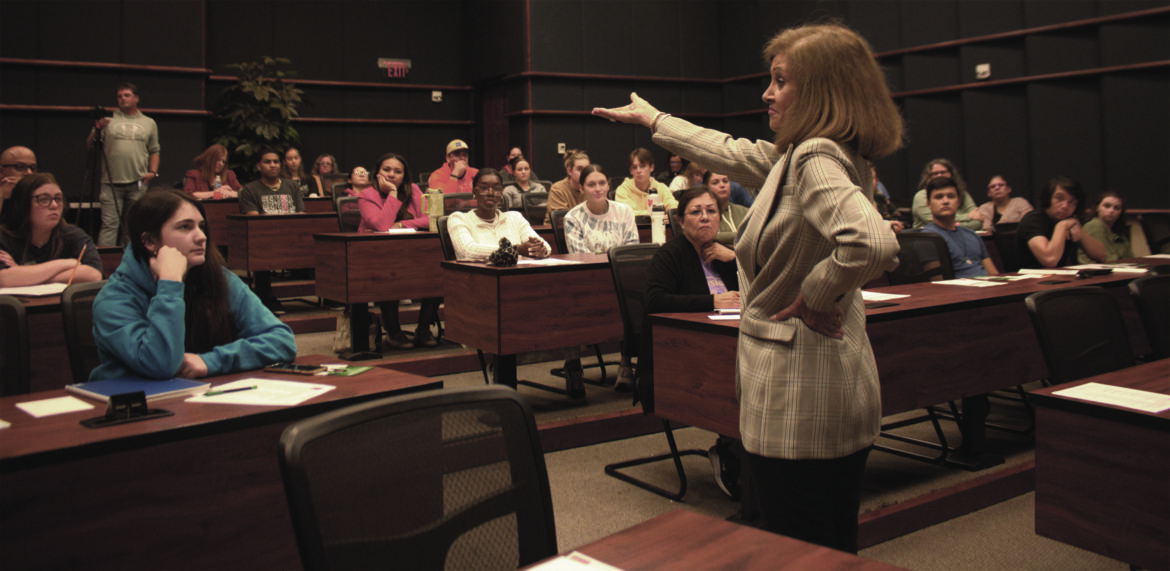By Britany Payette
At 7:30 p.m., Sept. 14 in the Cameron Theatre, the first speaker for Cameron’s Academic Festival XII, Michele Borba, Ed. D., talked about child and adolescent mental health and resilience.
The theme of this festival is “Care and Health: A Generational Approach.”
Borba is an educational psychologist and a renowned author who has served as a consultant for the U.S. Department of Education’s Character Education and Civic Engagement initiative.
She was a former special education teacher and has won the National Educator Award, Santa Clara University’s Outstanding Alumni Award, National Child Safety Award, and the Outstanding Contribution to the Educational Profession Award.
Borba said she was honored to be invited to speak at Cameron’s Academic Festival and was particularly excited about the student session that was specifically for Cameron students.
“I was just enthralled with it,” she said. “Too often, I talk to only the adults and not the students and this was just- the format was wonderful.”
The student session took place at 3:30 p.m., on Sept. 14, in the Johnson auditorium in Ross Hall. Borba said that teachers and students have really inspired her to continue advocating for mental health.
Borba said that in today’s fast-paced society, people need to learn new, effective coping skills.
“Resilience is something you are not born with,” Borba said. “You can acquire it; and why I’m saying it is … there’s evidence.”
She said that resilience is an ongoing process, not a program and that people need teachable skills to help people respond and react to life stressors.
“It’s not like we’re going to teach it this summer,” Borba said. “Or, I’m going to throw my kid in a resilience course … We’ve got to realize that this is extraordinarily important in today’s world. The world is changed. It’s more uncertain, it’s fear-based and it’s accelerated.”
She said people need to have a caring champion in their lives who supports them. Someone who can provide a safe place to breathe and get away from the stress that can build up in a person’s life. She said this can be anyone – your mom, your roommate, your therapist, anyone.
“You do not have to have dozens of friends,” Borba said. “There’s a myth in popularity. But, you do have to have a couple of people who are, (what) I’d consider glue people. They’re people you can go to who are going to support you.”
Borba said there are seven character strengths that are associated with thriving.
“It’s a rare person that has all seven,” she said. “But, if you just have a couple of them, they become like a protective buffer to help you.”
The seven character strengths are: self-confidence, empathy, self-control, integrity, curiosity, perseverance and optimism.
“You’ve got to do whatever you think works for you,” she said. “It’s one, two or three minutes a day and you do the same thing repeatedly.”
Borba said that one small habit that is practiced daily, even just for a few minutes, can help boost a person’s resilience.
“It’s never too late,” she said. “It doesn’t make a difference if you’re 85 or you’re four. You can make a difference, as long as we figure out what works for us.”
She said that COVID-19 caused a loneliness epidemic. Borba said that we need to set aside time to connect with real people.
“Empathy seems to be the social glue that holds the world together,” She said. “When stress rises, which it is doing right now,” she said. “One thing we do is we dial our empathy down, we start dialing it down because we’ve got to take in survival mode ourself.”
Borba said that when our empathy keeps going down and our stress levels keep going up it causes what she calls the empathy gap.
“As a result, what happens is our mental health as a nation is plummeting,” she said. “We get lonelier and lonelier. The solution is (find) who’s a couple of people, or one person, that you can connect a little bit more (with) and have some real life conversations with.”
One attendee at the event was Master of Science in Behavioral Science major Nanje Prinsloo, who said she came because she got extra credit for it and because it was related to her field of study.
“I really like that there was a visual presentation,” she said. “I really liked the speaker. She was very lively … It was very educational. She didn’t just speak from a piece of paper- she was very interactive. I think my favorite part was the stories that she told.”
Prinsloo said she felt like she learned a lot from the speaker and that the event was well organized.
“Especially when it comes to children’s self-confidence and being positive,” she said. “I think that mental health is very important, especially in young children and adolescence.”
Prinsloo said she would like to attend more events like this one.
For more information about CU’s triennial Academic Festival and this year’s speakers visit the Cameron website at https://www.cameron.edu/public-affairs/academic-festivals/festival-xii-speakers.

